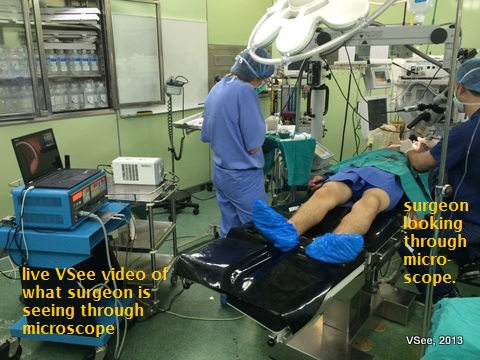Our remaining days in Duhok (Dohuk) Iraqi Kurdistan were spent mostly at the Azadi Teaching Hospital where we did telesurgery trainings all day until the hospital closed each day.

setting up VSee telesurgery for a mastoidectomy.
It turns out that the Azadi Hospital is the only public hospital in Duhok. What’s amazing is that all the services are provided free for all patients, including the Syrian refugees from the Domiz Syrian refugee camp we visited on our second day in Iraq. Anyone can get complex medical procedures, surgeries, and imaging services such as ultrasound, CT, etc. fairly quickly and all for free! It This local news article on Iraqi health care notes that Kurdistan health care has improved drastically in the past 15 years and that it is looking to become the health care hub in Iraq.
Perhaps its because of this that Azadi is only open from 8 a.m. to 2 p.m. each day. The other reason is to allow local doctors time to attend to their own private practices and clinics (which they all have) in the afternoon and evenings. In fact, the surgical team also worked with various private clinics where they would operate late into the evening each night, even though they were performing teaching surgeries nonstop at the Azadi hospital all day – mastoidectomies, nasal fungal infection, abdominal bypass surgery, abdominal hernia, laparoscopic surgery…
Teaching with VSee Telesurgery

VSee makes it simple to do telesurgery for teaching purposes. A simple attachment to the laparoscope or microscope allows VSee to stream whatever the surgeon is seeing via his scope to the local VSee video on a regular laptop computer. In-room observers can then see what’s happening on the laptop screen while remote mentors or students can see it on VSee video chat for teaching and guiding purposes. The photos above and below show the telesurgery setup for a laparoscopic surgery for abdominal hernia repair.

In past visits, when the surgeon was teaching during an operation (such as in the mastoidectomy pictured below), the operating surgeon would simply have to move out of the way and let each observing surgeon take a peek through the microscope before moving on with the surgery. This time, they could use VSee to stream the images from the microscope directly to a laptop. This made the teaching process more smooth and efficient. In fact, one of the surgeons, Dr. Marc Dean, a top Ear-Nose-Throat (ENT) specialist was able to complete 9 teaching surgeries in just one morning using VSee to stream the surgery over video 🙂
 Check out the size of that microscope!
Check out the size of that microscope!
VSee Surgery in a Box – Mobile Surgery Station

Another super cool way we were able to make use of VSee was to set up a mobile surgery clinic for a biopsy one day when all the operating rooms were in use. Instead of using the bulky hospital microscope (previously pictured), Dr. Dean was able to do the biopsy in a space-limited recovery room with the patient sitting in a chair, using a portable microscopic camera. Since the microscopic camera did not have an eyepiece, VSee video was used to display the image to a laptop. This is an exciting example of how VSee’s simple telemedicine set up can be used in creative and space-efficient ways to do surgery just about anywhere.
An Unforgettable Experience With World Class Surgeons
Getting to be a part of this dedicated, top-tier surgical group has been a privilege and awesome experience for the VSee team. Our group of American surgeons, lead by Dr. Gazi Zibari, have been coming to Azadi hospital for over 11 years. Each year they make about 3 trips to the hospital and other private clinics to perform challenging surgical operations as well as to train the local surgeons. The group includes some of the best surgeons in the world, including Dr. Frederick J. Stucker, who is considered the top ENT specialist. Dr. Stucker has operated on 4 U.S. Presidents, has performed over 9000 nose surgeries, and approximately 30,000 surgeries in total. (The ENT surgeon with the next highest record has only performed 4500 nose surgeries.) Dr. Zibari, besides spearheading these thrice-a-year visits to Iraqi Kurdistan, is also a Board Member and past president of the American College of Surgeons (Louisiana chapter) as well as a recipient of the Ellis Island Medal of Honor.
 One final group pic with the American Kurdish Medical Group at the Erbil International Airport before returning to California, back row from left to right: Milton Chen, Dr. Gazi B. Zibari and his niece, Dr. Frederick J. Stucker, Dr. John Thomas, Dr. Marc Dean; front row, left to right: Becky Wai, Julie Daugherty, Dr. Gazi’s cousin, Brian Spearman
One final group pic with the American Kurdish Medical Group at the Erbil International Airport before returning to California, back row from left to right: Milton Chen, Dr. Gazi B. Zibari and his niece, Dr. Frederick J. Stucker, Dr. John Thomas, Dr. Marc Dean; front row, left to right: Becky Wai, Julie Daugherty, Dr. Gazi’s cousin, Brian Spearman
Special thanks to our collaborating sponsors Operation Hope (OH), World Surgical Foundation (WSF), American Hepato-Pancreato-Biliary Association (AHPBA), The American Kurdish Medical Group (AKMG), Otorhinologic Research Institute (ORI), the Prime Minister of Iraq and Director of General Health for supporting this medical outreach trip to bring telemedicine and tele-education technologies to the developing world.





